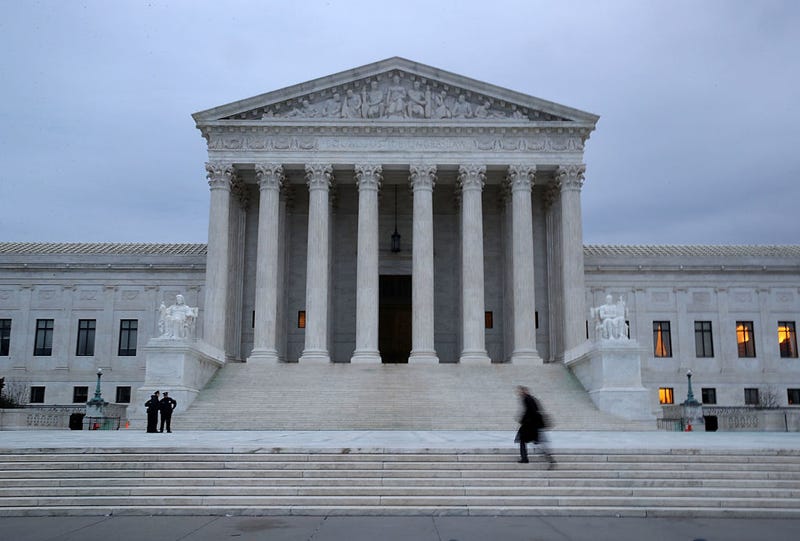
PHILADELPHIA (KYW Newsradio) — The U.S. Supreme Court has ordered the City of Philadelphia to resume using Catholic Social Services to place children in foster care, despite the agency's refusal to place children with same-sex couples. The court ruled the city’s stance on the issue violates the First Amendment.
The city had stopped contracting with CSS, on the grounds that its policy on same-sex couples violates Philadelphia's Fair Practices law, which forbids discrimination on the basis of sexual orientation. The Third Circuit upheld the city’s position, but the Supreme Court on Thursday was unanimous in overturning that decision, ruling that the city violated the free exercise of religious beliefs by forcing CSS to accept same-sex couples or stop providing foster care services altogether.
The opinion, written by Chief Justice John Roberts, says foster care is selective anyway — not a public accommodation, like riding a bus or eating in a restaurant. The justices ruled the city can and should make an exception to allow the agency to place children in accordance with its religious beliefs and, essentially, allow it to discriminate.
"CSS seeks only an accommodation ... to continue serving the children of Philadelphia in a manner consistent with its religious beliefs," he wrote. "It does not seek to impose those beliefs on anyone else."
Philadelphia Archbishop Nelson Perez praised the justices’ decision for affirming the archdiocese’s “First Amendment rights … and all charitable ministries in the United States who are inspired by their faith to serve the most vulnerable.”
In a statement, he said the ruling allows “foster families to find an agency that shares and reflects their faith, and for foster children to find a loving home. It also protects our enshrined right to religious freedom and celebrates the rich diversity of religious beliefs in the United States.”
“It is my personal hope that today’s decision makes it abundantly clear that religious ministries cannot be forced to abandon their beliefs as the price for ministering to those in need,” Perez continued, in part. “We can all live and work peacefully, side-by-side, to create a better and brighter future for all of our children.
“We have partnered successfully with city government to serve the people of Philadelphia many times, and we look forward to continuing a fruitful partnership in the future.”
“This case rejects that idea that you have to surrender your constitutional protections just as a function of participating in public life," said Archdiocesan Attorney William Rahn.
"It makes clear there are no special rules for when governments enter into contracts. The free exercise clause is the free exercise clause."
Deputy Mayor Cynthia Figueroa called it a setback for the city’s effort to guarantee non-discrimination "in clearly stating that in this particular instance, Catholic Social Services needs to be allowed to discriminate against same-sex couples based on their religious freedom."
She saysid the city is still studying the opinion to decide next steps, but she wanted to reassure the LGBTQ community.
“This doesn’t dissuade us from wanting and embracing and supporting and valuing the LGBTQ foster parents in our network, as well as those who would be interested in becoming foster parents."
Figueroa said there are a disproportionately high number of LGBTQ youth in foster care, and she thinks the ruling sends them a confusing message.
City solicitor Diana Cortes responded to the court’s decision with an official statement, calling it "difficult and disappointing."
"With today’s decision, the Court has usurped the City’s judgment that a non-discrimination policy is in the best interests of the children in its care, with disturbing consequences for other government programs and services," Cortes wrote.
"At the same time, the city is gratified that the Supreme Court did not, as the plaintiffs sought, radically change existing constitutional law to adopt a standard that would force court-ordered religious exemptions from civic obligations in every arena."
Cortes says the city's nondiscrimination requirement encouraged a larger, more diverse pool of foster parents and extended acceptance and inclusion to the many LGBTQ young people in city's care. Allowing city contractors and partners to set their own terms will create confusion among government programs and weaken nondiscrimination guarantees, she says.
"Despite the challenges posed by today’s ruling, we will continue to care for our city’s foster care youth, including in partnership with Catholic Social Services, and to support the loving families who welcome them into their homes," she wrote.
"The City will continue to protect and include all Philadelphians, including LGBTQ youth and families, while recognizing and respecting the Supreme Court’s ruling."
The judges unanimously ruled in favor of Catholic Social Services, but differed in their reasons for doing so. Roberts' majority opinion was very specific and did not overturn the precedent that religious beliefs cannot overcome anti-discrimination laws in all cases.
